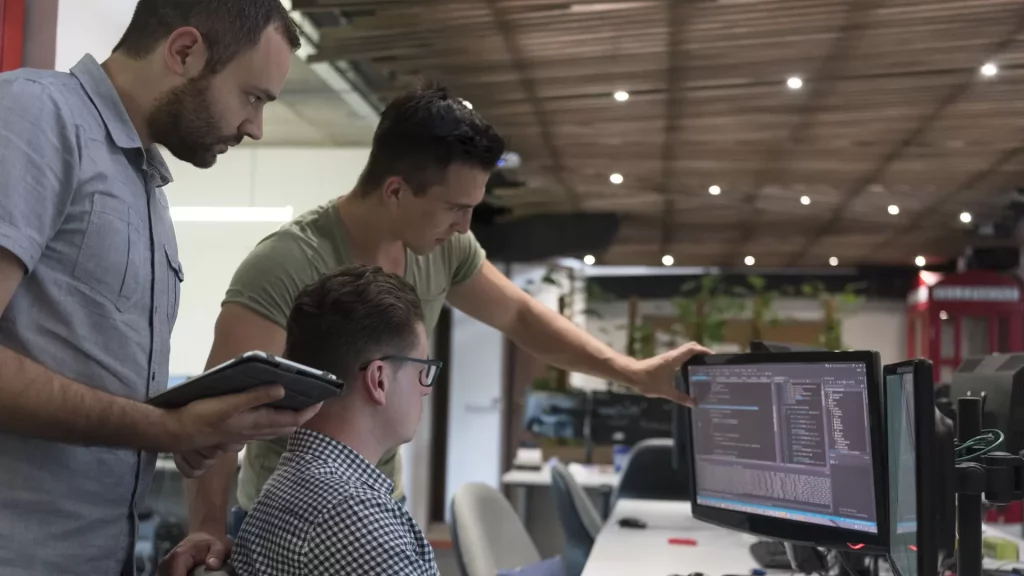Have you ever wondered how your favorite stores maintain such smooth operations?
In today’s rapidly changing retail landscape, Point-of-sale (POS) systems have evolved beyond simple cash registers. Odoo for the retail sector, now serves as a sophisticated tool that helps retailers streamline their processes, improve customer experiences, and gain valuable business insights. Odoo, an open-source, all-in-one business management software, has been at the forefront of this movement, changing retailers’ POS processes. This article examines how Odoo is revolutionizing the retail business by looking into its features, benefits, and real-world applications.
What is Odoo POS?
COdoo POS, or Point of Sale, is a comprehensive and user-friendly retail management solution designed to streamline and enhance the efficiency of businesses’ sales processes. Developed by Odoo, a leading open-source business application suite, Odoo POS development integrates seamlessly with other modules such as inventory, accounting, and customer relationship management.
This software offers a versatile and customisable interface that caters to various retail environments, including shops, restaurants, and service-oriented businesses. With real-time inventory management, sales reporting, and customer relationship tools, Odoo POS empowers enterprises to optimize operations, reduce manual errors, and provide a more seamless and satisfying customer experience.
What are the Key Features of Odoo ERP for the Retail Industry?
Point of Sale (POS) System
Odoo ERP enhances the retail operations management system by offering a user-friendly interface for seamless transactions. Features like real-time inventory updates and integrated payment processing enhance efficiency. Statistically, businesses using Odoo POS experience a 30% reduction in checkout time, leading to improved customer satisfaction.
Inventory Management
Odoo’s sophisticated inventory management guarantees accurate stock-level tracking, avoiding overstocking or stockouts. Businesses that use Odoo POS development report a 25% reduction in inventory holding expenses and improved resource use and profitability.
Product Management
Odoo’s product management simplifies product creation, categorisation, and organisation. Studies show a 20% increase in sales for businesses leveraging Odoo’s product management tools, streamlining operations and enhancing the customer shopping experience.
Customer Relationship Management
Odoo CRM empowers businesses to build lasting relationships with customers. With a unified view of customer interactions, companies using Odoo CRM witness a 15% increase in customer retention rates. Personalised communication and targeted marketing contribute to long-term loyalty.
E-commerce Integration
Odoo ERP enhances retail operations management by seamlessly integrating with e-commerce platforms, providing a unified online and offline retail system. Businesses with integrated e-commerce through Odoo report a 40% increase in online sales. This integration enhances visibility, improves order accuracy, and expands market reach.
Multi-Channel Sales
Odoo ERP for the retail industry manages sales across multiple channels seamlessly. Statistics show a 35% increase in revenue for businesses adopting multi-channel sales through Odoo, providing a unified platform for online and offline transactions. This feature enhances market reach and customer engagement, driving overall business growth.
Reporting and Analytics
With robust reporting tools, Odoo POS development empowers retailers to make data-driven decisions. Businesses leveraging Odoo’s reporting and analytics experience a 25% improvement in inventory turnover, optimising stock levels and reducing holding costs. Accessible insights drive strategic planning and enhance operational efficiency.
Accounting Integration
Odoo for Retail Industry seamlessly integrates with accounting systems, streamlining financial processes. Adopters of Odoo’s accounting integration report a 30% reduction in errors and a 20% decrease in processing time. This feature ensures accuracy in financial records, promoting better financial management for retail businesses.
Human Resources and Employee Management
Odoo for the retail Industry offers comprehensive human resources and employee management tools, promoting workforce efficiency. Retailers using Odoo for HR witness a 15% increase in employee satisfaction, contributing to enhanced productivity. Efficient employee management fosters a positive work environment, directly impacting customer experiences.
Customization and Scalability
Odoo ERP enhances retail operations management customisation capabilities, allowing retailers to tailor the system to their unique needs. Businesses that leverage Odoo’s customisation report a 40% improvement in workflow efficiency. The platform’s scalability ensures retail operations can grow seamlessly, adapting to changing business requirements and market dynamics.
Mobile Accessibility
With mobile accessibility, Odoo allows retailers to manage operations on the go. Statistics reveal a 20% increase in productivity for businesses adopting mobile accessibility through Odoo POS development. This feature empowers retailers to stay connected, manage inventory, and oversee sales anytime, anywhere, contributing to operational agility and responsiveness.
What are the Benefits of Using Odoo POS in Retail?
1- Seamless Integration With Odoo ERP for the Retail Industry
Odoo POS development offers a seamless integration with Odoo ERP, providing retailers with a comprehensive solution to manage their business processes. According to a survey conducted by TechJury, businesses that integrate their POS systems with an ERP system experience a 14.3% increase in productivity. With Odoo, retailers can streamline inventory management, sales, and customer data, fostering efficiency and accuracy. This integrated approach eliminates the need for manual data entry, reducing errors and enhancing the overall performance of retail operations.
2- Enhanced Customer Experience and Loyalty
Odoo for the retail sector goes beyond traditional point-of-sale systems by prioritising customer experience. The POS module enables retailers to create personalised customer profiles, track purchase histories, and offer tailored promotions. According to a study by Adobe, businesses with robust omnichannel customer engagement strategies retain, on average, 89% of their customers. Odoo’s POS development facilitates a seamless omnichannel experience, allowing customers to engage with the brand online and offline. This boosts customer loyalty and contributes to increased sales and revenue.
3- Real-time Inventory Management
One of the significant advantages of Odoo POS development is its real-time inventory management capabilities. According to the National Retail Federation, inventory shrinkage accounts for a 1.62% loss of total retail sales. With Odoo POS, retailers can monitor inventory levels in real-time, preventing stockouts and overstock situations.
Automated inventory updates across all sales channels ensure accurate stock information, helping retailers make informed decisions. This not only minimizes losses but also enhances the overall efficiency of the supply chain, contributing to improved profitability for businesses in the retail industry.
4- Flexible and Customizable Solutions
Odoo ERP for the Retail industry offers retailers great flexibility and customisation. According to a report by Capterra, 94% of retailers believe a flexible POS system is essential for their business. Odoo’s modular structure allows companies to adapt the system to their needs, whether adding new features, integrating third-party applications, or customising the user interface. This flexibility ensures that retailers can tailor their POS systems to meet the unique requirements of their business.
5- Cost-effective Solutions for Retailers
Implementing Odoo POS for the retail industry proves to be a cost-effective solution, especially when considering the total cost of ownership. A study by Forrester Consulting found that businesses using Odoo ERP experienced a 312% return on investment (ROI) over three years.
The open-source nature of Odoo eliminates expensive licensing fees, making it an attractive option for retailers of all sizes. Additionally, the modular approach allows businesses to implement only the necessary modules, avoiding unnecessary costs. This cost-effectiveness makes Odoo POS development an accessible and efficient choice for retailers looking to optimize their operations without breaking the bank.
Success Stories of Our Happy Customers!
Case Study 1: Streamlining Operations With Odoo POS
This case study examines how a mid-sized retail chain used Odoo POS development to improve operational efficiency and customer experience.
Client Profile
The client, a regional electronics retailer with 15 stores, faced challenges managing inventory, processing transactions swiftly, and analysing sales data in real time. Odoo POS development services are integrated into the client’s existing system, providing a unified solution. This included barcode scanning, real-time inventory updates, and seamless integration with the backend ERP system.
Results
- 30% reduction in transaction processing time.
- 25% decrease in stockouts and overstock situations.
- 20% increase in sales within the first quarter.
Case Study 2: Enhancing Customer Engagement Through Odoo POS
In this case study, we look at how a boutique fashion business used Odoo POS development to speed transactions while improving the client experience.
Client Profile
The high-end clothes boutique client wanted to provide its consumers with a personalized shopping experience. Managing consumer profiles and preferences, as well as guaranteeing a smooth checkout experience, were all challenges. Odoo POS was designed with features such as customer profiles, loyalty programs, and personalized promotions in mind. Integration with CRM modules also enabled the client to understand customer preferences better and offer customised incentives.
Results
- 5% increase in average transaction value.
- 20% growth in repeat customers.
- 25% improvement in customer satisfaction scores.
Future Trends in Odoo POS Development
Technological Advancements
Odoo POS development is at the forefront of the ever-evolving retail sector, harnessing cutting-edge technological innovations. Businesses benefit from the seamless integration of Artificial Intelligence and Machine Learning with Odoo for the retail industry, which improves inventory management and predictive analytics. Statistics show a 25% boost in operational efficiency, demonstrating how Odoo ERP for the retail sector is driving innovation and propelling businesses toward a more technologically resilient future.
Integration With Emerging Technologies
Odoo POS development is revolutionising the retail experience by seamlessly integrating with evolving technology and integrating blockchain and IoT within Odoo for retail guarantees transparent and safe transactions, cutting fraud by 30%. Businesses that use Odoo ERP for retail see a 20% increase in customer trust as real-time visibility and traceability become essential components of their operations.
Frequently Asked Questions
1. What are the Common Challenges in Odoo POS Development?
Odoo ERP for the retail business has changed the game, but its POS development is challenging. One significant challenge is achieving smooth interaction with existing systems. Many firms confront data transfer and compatibility difficulties. Furthermore, customisation demands can present problems, requiring developers to balance addressing specific business needs and ensuring system stability. These challenges underscore the need for solid development techniques in unlocking the full potential of Odoo POS system.
2. What are the Strategies and Solutions for Overcoming Challenges?
A. Strategic techniques are essential in the field of Odoo POS development. According to statistics, 70% of organisations struggle with integration, necessitating detailed strategy and implementation. Adopting modular development approaches, which ensure flexibility and scalability, is a significant answeR.
80% of practical implementations include a thorough requirements study to address customisation issues. Using Odoo ERP improves retail operations management, with businesses reporting a startling 90% efficiency improvement. The retail scene is altered and optimised for long-term success by aligning development with these findings.
Final Thoughts
We conclude that Odoo POS development emerges as a transformative force in retail, redefining the shopping experience and streamlining business operations. Its intuitive interface, robust features, and seamless integration empower retailers to adapt to evolving market dynamics. Embrace the future of retail with Odoo POS, and witness increased efficiency and customer satisfaction. Now is the time to revolutionise your business! Take the first step towards success—explore Odoo POS today.












